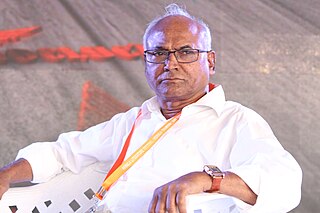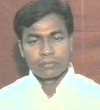Vedanta Limited is an Indian multinational mining company headquartered in Mumbai, with its main operations in iron ore, gold and aluminium mines in Goa, Karnataka, Rajasthan and Odisha.

Kancha Ilaiah Shepherd is an Indian political theorist, writer and a Dalit rights activist. He writes in both English and Telugu languages. His main domain of study and activism is the annihilation of caste.

Kalahandi district is a district of western Odisha in India.

Khonds are an indigenous Dravidian tribal community in India. Traditionally hunter-gatherers, they are divided into the hill-dwelling Khonds and plain-dwelling Khonds for census purposes, but the Khonds themselves identify by their specific clans. Khonds usually hold large tracts of fertile land, but still practice hunting, gathering, and slash-and-burn agriculture in the forests as a symbol of their connection to, and as an assertion of their ownership of the forests wherein they dwell. Khonds speak the Kui language and write it in the Odia script.

Vedanta is a proposed, private, multi-disciplinary, co-educational university to be started by Anil Agarwal of Vedanta Resources corporation near Puri-Konark highway, Odisha, India. In July 2009, the government of Odisha passed a landmark bill to allow this massive university to be set up and function with autonomy. According to news reports and as of September 2010, there were no clear plans regarding the establishment of this proposed University. However, in late April 2015 a revival of the project was initiated; The ex-Chief Secretary of Odisha, Mr. Bijay Patnaik, was hired as the President of the Vedanta University Project to revive this project.

Anil Agarwal, known professionally as "metal king," is an Indian billionaire businessman who is the founder and chairman of Vedanta Resources Limited. He controls Vedanta Resources through Volcan Investments, a holding vehicle with a 100% stake in the business.
Vedanta Resources Limited is a diversified mining company headquartered in London, United Kingdom. It is the largest mining and non-ferrous metals company in India and has mining operations in Australia and Zambia and oil and gas operations in three countries. Its main products are Zinc, Lead, Silver, Oil & Gas, Iron Ore, Steel, Aluminium and Power. It has also developed commercial power stations in India in Odisha and Punjab.

Caste-related violence in India has occurred and continues to occur in various forms.
The red corridor, also called the red zone or according to the Naxalite–Maoist parlance the Compact Revolutionary Zone, is the region in the eastern, central and the southern parts of India where the Naxalite–Maoist insurgency has the strongest presence. The red corridor has been steadily diminishing in terms of geographical coverage and number of violent incidents, and in 2021 it was confined to 25 "most affected" and 70 "total affected" districts across 10 states in two coal rich, remote, forested hilly clusters in and around Dandakaranya-Chhattisgarh-Odisha region and tri-junction area of Jharkhand-Bihar and-West Bengal.
Khandayat, also spelled Khandait, is a cultivating caste, as well as a peasant militia or landed militia caste from Odisha, East India. Some of them had earlier served as feudal chiefs as well as zamindars apart from being land holders and agriculturalists. Numerically they are the largest caste of the state.

Gandhamardan Hills or Gandhamardan Parbat is a hill located in between Balangir and Bargarh district of Odisha, India. This hill is well known for medicinal plants. There is a Bauxite reserve which is planned for exploration by the state government through a private venture. Lord Parshuram is believed to reside here.
Naresh Chandra Saxena is an Indian bureaucrat who served as a member of the Planning Commission of India.
Lodu Sikaka is a Dongria Kondh tribal and a leader of Niyamgiri Suraksha Samiti in Odisha state, India. According to the advocacy group Survival International, reporting local sources, he was one of two leaders who were abducted in August 2010 after they had been peacefully protesting a bauxite mine that Vedanta Resources and the Government of Odisha proposed to create on land upon which the tribe traditionally depended. Some reports at the time suggested he was being held by the police, though the police themselves refuse to confirm this.

Bhakta Charan Das is an Indian politician. He was a member of the Indian Parliament and represented the Kalahandi constituency in the 15th Lok Sabha.
The Dangaria Kandha people are members of the Kondhs. They are located in the Niyamgiri hills in the state of Odisha in India. They sustain themselves from the resources of the Niyamgiri forests, practising horticulture and shifting cultivation. They have been at the centre of a dispute over mining rights in the area.
The Niyamgiri is a hill range situated in the districts of Kalahandi and Rayagada in the south-west of Odisha, India. These hills are home to Dongria Kondh indigenous people. The hills have one of India's most pristine forests in the interior. It is bound by Karlapat Wildlife Sanctuary on the north-west side and Kotgarh Wildlife Sanctuary on the north-east end.
Vedanta Jharsuguda Power Station is a coal based thermal captive power plant located near Jharsuguda town in Jharsuguda district in the Indian state of Odisha. The power plant was commissioned in July 2008, and is operated by Vedanta Resources. It supplies power to aluminum smelter of Vedanta Resources.

Orissa Mining Corporation v. Ministry of Environment & Forest & Others is a landmark decision by the Supreme Court of India, which declared that Gram Sabha has a role to play in safeguarding the customary and religious rights of the STs and other Traditional Forest Dwellers (TFDs) like Dangaria Kondha etc. under the Forest Rights Act. The Apex Court maintained that the decision lies with the locals.
Kucheipadar, a village in Kashipur subdivision, Rayagada district, Orissa in India, became famous for its well-known tribal movement opposing the mining proposals made by the Utkal Alumina International Limited (UAIL) in the region which started in 1996. In the mid-1990s, large deposits of bauxite were discovered in the area, simultaneously private companies were given leases of the land by the government without proper consultations. The local tribal residents became aware of the project when in 1996 the UAIL project team went there to conduct a survey. Utmost confusion about the nature of the project, its impact on regional livelihood and the future of residents led the tribals to organise a civil disobedience campaign. The movement later spread to the entire region of Kashipur.
Wira Pdika is a 124-minute 2005 film independently produced and directed by Samarendra Das and Amarendra Das, characterised by the reviewer Subrat Kumar Sahu as 'a milestone in terms of authenticity in documentary filmmaking'.









